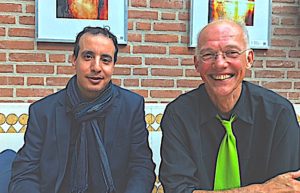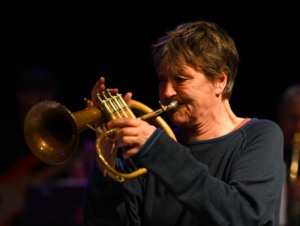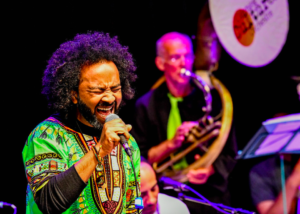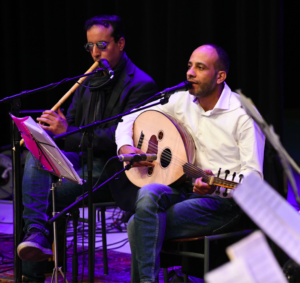UTRECHT — These are tumultuous days in Europe. Nationalist politicians are pushing a hard, anti-immigrant line in the lead-up to the European Union elections this week. A cluster of far right parties, led by the Italian Matteo Salvini of The League, Marine Le Pen of France’s National Rally party and Geert Wilders of The Netherlands’ Party for Freedom are trying to take over the EU “from within” as Le Pen says and set a nationalist direction.
In the city of Utrecht, where Wilders once sat on city council, there is a different message being spread.
In the Overvecht neighbourhood, where some 80 different nationalities reside, many of them asylum seekers, music is bringing people together in hope and pleasure instead of pushing them apart.
The music is being made by the Catching Cultures Orchestra which started in 2015 as a temporary collaboration between a Dutch wind ensemble called De Tegenwind and a group called the Band without a residence permit.

Hamed Alshaabi and Roelof Wittink of Catching Cultures Orchestra. Photo: Peter Robb
Catching Cultures Orchestra has around 25 permanent members, including a core group of seven or so refugees from countries such as Syria and Sudan. There is a wider community of musicians of various backgrounds who occasionally play with Catching Cultures. That now includes four members of the NAC Orchestra — Sean Rice, clarinet, Chris Lee, tuba; Don Renshaw, trombone and Michael Fedyshyn on trumpet. They were there on Sunday night in the Zimihc Theatre in the Stefanus community centre in Overvecht for an energetic, moving jam session.
The band, with the NACO players fitting easily into the mix, rehearsed for about an hour and then after a meal together of chicken, rice, potatoes, vegetables and soup, they got down to business.
The concert on Sunday night was a joyous affair led by the orchestra’s charismatic artistic director Hermine Schneider. She played her flugelhorn and generally danced up a storm as the band played song after song of Middle Eastern influenced music that had the musicians and much of the audience dancing in time.

Hermione and her horn. Photo: Fred Cattroll
“We are really interested to keep the varying traditions alive and at the same time build on those traditions,” Roelof Wittink, who is the business manager of Catching Cultures, told ARTSFILE.
One of the refugee musicians in Catching Cultures is Hamed Alshaabi. He is of Palestinian heritage who was born in Homs, Syria where he lived and worked as a veterinarian. But, like so many, he was forced to leave his home because of the civil war.
He said in an interview, that he left in 2014, travelling through Turkey to Italy and then north finally to The Netherlands and Utrecht, where the 37 year old lives today.
“I travelled with my nephew. He was 14 at the time. He lost his father in the war when a car bomb exploded outside the mosque.”

Sam Ahmed, left, is a Sudanese refugee who has been working with Catching Cultures for a couple of years. That’s Roelof Wittink and his Sousaphone in the background. Photo: Fred Cattroll
In addition to studying for his veterinary qualifications, Alshaabi also studied music.
He learned to play a wind instrument like a wooden flute called the ney, which is made of a special hollow reed. It has been played in the Middle East for hundreds of years. He also plays another type of flute called the kawala which gives a “warmer, more emotional sound” that the ney, he said. On Sunday night Alshaabi, who bears a slight resemblance to Peter Sellers, the British actor, had a small case containing several flutes of different sizes, all of which he played in the concert while sporting a pair of sunglasses.
In a story that would be familiar to many professionals immigrating to Canada, Alshaabi has to update his credentials before he can practice veterinary medicine again. Meanwhile he has created his own business buying veterinary products for animals and shipping them to the Middle East.
Ironically, Alshaabi’s neighbourhood in Homs was almost as diverse as the area he lives in in Utrecht today.
“My street in Syria had Christians, Alawites, a lot of different groups. There wasn’t a lot of conflict,” he said, “because there was a lot of diversity in the area. In other places where there was ‘one colour,’ there were a lot of problems.”
Wittink, who also plays a mean Sousaphone, explained the history of Catching Cultures.
“A wind orchestra from Utrecht was interested in music from all over the world. We like to travel but we realized that we didn’t have to travel so much because lots of new people come to The Netherlands, some times for bad reasons. So we went to the asylum seekers centre in Utrecht. There was a group of musicians over there and we started to play with each other.”
“It grew from there.”
The make-up of the group has evolved over the years. There are now some players from Sudan and Kurdistan. As newcomers arrive they are welcomed with music, Wittink said.
For the Dutch musicians, the ability of music to bring people together “was a big surprise when it happened.
“One of the first performances we did, the municipality invited people who had just arrived in Utrecht and we started to play and immediately everyone was mingling together,” Wittink said.

Hamed Alshaabi and Mohamad Alsamma. The latter just became a Dutch citizen. Photo: Fred Cattroll
For westerners used to an audience sitting in their seats in front of the performers, this wasn’t what “we were used to.”
They now bring asylum seekers from the refugee centres in Utrecht for their concerts and it’s “a big party.”
Alshaabi says he is learning a lot from playing in Catching Cultures.
“Music is a language that everyone can understand. We can exchange cultures through music.”
Migrants have been coming into the Netherlands since the 1960s when Turks and Moroccans arrived to fill vacant jobs in the country. In the past half-decade the crush of asylum seekers from Syria, Sudan, Afghanistan and further afield has out pressure on Dutch society.
Alshaabi is cautious when speaking about politics. He’s willing to watch quietly and hope that things will sort themselves out. There is some truth in that position as the far right parties do not command the kind of support that parties in Italy and Hungary can obtain.
Wittink is less hesitant to speak.
“There are some populist parties that are growing and the government is leaning very much towards them and I hate that. We do not have a human rights policy towards refugees any more.
“The interesting thing with our orchestra is that so many people love this. We have not heard of anyone trying to oppose us one way or the other.
“We get invitations from companies, from different organizations, they all want us to have a sustainable organization.”
Locally there is a lot of co-operation in the city, he said.
It helps that Utrecht, which is a university town, is one of the most liberal cities in The Netherlands. The party with the most support in the city, he said, is the GreenLeft.
It’s hard to know who gets the most out of these musical moments. Both sides certainly enjoy themselves. They were smiling at each other and at the antics of their leader Hermine Schneider.
For Wittink, “both sides are learning. We are learning a lot about the music of the home countries of the musicians, about the way they play and about musical structures and scales.”
On Sunday, the band was also celebrating some happy news. The oud player, Mohamad Alsamma, has just been made a Dutch citizen, having lived in the country for five years, learned the language and passed all the other hurdles.
Interestingly, because Alsamma is Palestinian, he has never had a passport before and now he can travel back to the Middle East, if he chooses, as a Dutch citizen.







